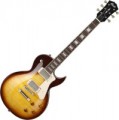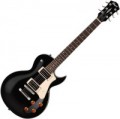A method of attaching the neck to the body used in an electric guitar.
—
Boltov. The most inexpensive and practical (in terms of production and repair technology) method of attachment: the neck is bolted to the body. Thanks to this, the assembly of the guitar is extremely simple, and the neck can be easily removed from the finished instrument for repair or even replacement with a new one. Note that although the bolt method is considered “low-cost” (and is found mainly in instruments of the corresponding level), it cannot be said that it is definitely worse than other options: guitars of this design have relatively weak sustain, but they give a bright, sharp tone with good attack. They can be used in almost any genre, but they are still considered the most suitable for heavy music.
—
Pasted. A neck mounted in a recess in the body and secured to the recess with epoxy or other adhesive. This design does not allow for such a powerful attack as on bolt necks, but it provides excellent sustain and a pleasant coloration of the sound. And in general, the adhesive connection is considered more advanced, because. better reveals the acoustic properties of wood. On the other hand, such tools are more complicated and more expensive, both in production and in repair, than “bolted” ones.
—
Through. The name of this method is due to the fact that the neck passes
...through the body through and through, to the “lower” (from the side of the bridge) butt. Many instruments of this type, from the back, look as if two additional pieces were attached to the solid piece of wood from which the neck and middle part of the body were carved to give the body the desired shape and width (although the manufacturing technique is, of course, somewhat more complicated). It is believed that the neck-through mount maximizes the capabilities of the wood and allows you to achieve the highest quality sound, with a flat frequency response and excellent sustain. However, such designs are very expensive, and besides, they require extremely careful handling — especially since the repair of a through neck is at best difficult and expensive, and often impossible at all. Note that this option is used mainly in basses, electric guitars with a through mounting method are produced much less frequently.The material from which the neck of an electric guitar is made.
The most commonly used in the manufacture of the neck is
mahogany.
and
maple. Theoretically, the acoustic properties of an instrument are determined by all its details, and even more so, these properties are affected by the quality of the fretboard. At the same time, we note that this influence is not so strong compared to other characteristics of the guitar (type and number of pickups, scale size, body type, etc.). So in this case, it makes no sense to describe in detail each type of material found in modern instruments — especially since the same term (for example, “mahogany”) can denote different types of wood that differ markedly in working properties and overall quality. When evaluating the material of the neck, it is quite possible to proceed from the fact that the manufacturer selects it in accordance with the price category and the general specialization of the guitar.

